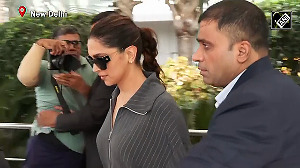A good test to determine whether an idea has really caught the imagination of the public is to ask not so much whether its supporters back it, as whether its detractors pay lip service to it. Going by this test, The Hindu's campaign to defend itself against the outrageous punishment (15 days imprisonment) imposed on its publisher and four journalists by the Tamil Nadu legislative assembly has proved a winner.
It has drawn support not only from all sections of journalists, but also from such unlikely figures as the pro-AIADMK maverick Cho Ramaswamy, newspaper owners, and BJP leaders, including Mr L K Advani, who has been politically cultivating Ms Jayalalithaa. Even Mr George Fernandes -- her close friend who attended her foster-son's super-ostentatious multi-crore wedding -- has termed her vendetta against The Hindu an excess worse than the Emergency.
Ms Jayalalithaa has bitten off more than she can chew. The Supreme Court by ordering a stay on the assembly's sentence has rapped her on the knuckles. In response, she has filed yet another defamation suit against The Hindu for an April 13 article. She will either have to escalate the confrontation and invite more trouble, or simply eat crow. Her assault on The Hindu under the guise of breach of legislative privilege was the culmination of a series of actions against the paper ever since she came to power in May 2001, including 16 criminal defamation suits and one civil libel case. This is of a piece with her intimidatory tactics against all those who don't genuflect before her -- including discrimination in government-sponsored advertising, censorship, political pressure and physical harassment. She has filed some 130 cases for defamation alone!
Ms Jayalalithaa probably made two calculations to convince herself that she would get away with her attack upon India's most reputed daily. First, she reckoned that recent divisions within the extended family that owns the paper would prevent a concerted response. Second, the BJP regards her highly -- not least because she supported the Babri Masjid demolition (the only politician outside the Sangh Parivar to do so), and rationalised Gujarat's communal pogrom. The BJP also needs the AIADMK as some kind of spoiler. That's why it is distancing itself from AIADMK rival and NDA partner, the DMK.
Differences within The Hindu group are an undeniable fact. They became manifest four months ago when Mr N Ram was appointed editor-in-chief, eclipsing Editor N Ravi and Executive Editor Malini Parthasarathy. But Ms Jayalalithaa was totally wrong to assume that intra-family political and business differences would fail to unite the group as a whole, or that a principled journalist of integrity like Ram wouldn't spiritedly defend his colleagues. If anything, her actions will tend to reunite the family. Politically too, Ms Jayalalithaa badly underestimated the force of public opinion which impelled it to support The Hindu vis-à-vis her. Thus, Mr Arun Jaitley, who had vehemently defended the draconian Prevention of Terrorism Act, and other repressive laws, suddenly turned a crusader for freedom.
Ms Jayalalithaa's credibility stands badly dented. There is absolutely nothing in the articles condemned by the Tamil Nadu assembly's privileges committee which can even be remotely considered as scandalising or tarnishing the House or lowering its prestige. They don't remotely constitute a breach of privilege.
Shocking and revolting as this episode is, it's a good occasion to take stock of the privileges claimed by certain institutions. Three major issues arise: legislative privilege; the power of judicial contempt, with its 'chilling effect' on free expression; and more generally, free expression and Constitutional rights. It would be a pity if the process of review and revision of the issues stopped with the breach-of-privilege case against The Hindu alone. This is a historic chance to strengthen the rights-based foundations of Indian democracy.
To start with, the concept and practice of legislative privilege has medieval origins. It goes back to a period when the then still-weak English parliament was struggling to defend and assert itself against an all-powerful monarchy. Claiming 'privilege' was the MPs' sole way of protecting themselves against the Crown's sweeping powers to do anything, including arrest and harass 'trouble-makers.' This bears no parallel with today's India. Privilege only makes sense today as a means of strengthening the independent functioning of legislatures. For instance, it is improper for a minister to make a policy statement in public before speaking in Parliament; that's the (limited) privilege of MPs. Privilege cannot extend to MPs' protection from public scrutiny or fair comment -- by labelling it an attempt to denigrate Parliament's 'reputation.'
The privilege power has been misinterpreted and abused in India a number of times. Some of the worst instances come from Tamil Nadu. For instance, in 1987, the Tamil Nadu assembly ordered the jailing of S Balasubramanian, editor of the weekly Anand Vikatan, for demanding that legislators' privilege be codified -- a perfectly reasonable demand. The Speaker, the AIADMK's P H Pandian, declared that the Speaker's powers are 'sky-high,' unlimited. In 1991, The Illustrated Weekly of India's K P Sunil wrote an article headlined 'Tamil Nadu Assembly Fast Gaining Notoriety.' The Speaker (from the AIADMK) issued a warrant for his arrest. The Supreme Court stayed his arrest. But it wasn't for another five years that the Speaker (from the DMK) dropped the proceedings against him.
In the 1980s and 1990s too, a number of Speakers issued notices of breach-of-privilege to journalists who wrote critically about their (controversial) decisions or about raucous assembly proceedings. I was one of them. Newspaper managements would often apologise to avoid an unpleasant confrontation. But this only encouraged the abuse of privilege. No code was ever drafted to ensure that the privilege power would be 'exercised with restraint and within the scope and ambit of life, liberty and due process of law,' as recommended by a House of Commons report in 1967 and reiterated in 1997-99. This must now change.
Equally important is scrutiny of the judicial power of contempt, which too has been misconstrued. Two years ago, the Supreme Court sentenced writeractivist Arundhati Roy for contempt, without giving her an opportunity to be heard. The Court said: 'Judicial process and institution cannot be permitted to be scandalised or subjected to contumacious violation in such a blatant manner in which it has been done Vicious stultification and vulgar debunking cannot be permitted to pollute the stream of justice '
In India, even truth is no defence against contempt. The 'dignity' and 'reputation' of the judiciary can be defined arbitrarily by a judge, and a writer punished even for a fair comment intended not to malign the judiciary, but to point out its flaws. These flaws aren't imaginary. Judges are human and make mistakes, sometimes grave ones. The contempt power has been misused to stifle criticism and evade public accountability -- not to defend the judiciary's dignity. This must be sacrificed, so to speak, at the altar of truth, freedom and democracy.
This raises another point. The right to the freedom of expression is vital and fundamental. But equally important, even more basic, is the right to life, to survive, without which other rights become meaningless. This all-important right stands menaced and jeopardised by a number of laws, and procedures and practices, including police excesses, arbitrary arrests, custodial deaths, etc. At least 23 draconian laws exist on India's statute books. Nine of them pertain to border states, such as the Punjab Security of State Act, 1953; Assam Disturbed Areas Act, 1955; Armed Forces (Assam and Manipur) Special Powers (Amendment) Act, 1972; and Armed Forces (Jammu and Kashmir) Special Powers Act, 1990.
Five pertain to 'mainstream' states such as Tamil Nadu Prevention of Dangerous Activities of Bootleggers, Drug-Offenders, Forest Offenders, Goondas, Immoral, Traffic Offenders and Slum-Grabbers Act, 1982; Maharashtra Control of Organised Crime Act, 1999; Andhra Pradesh Control of Organised Crime Bill, 2001. Nine are all-India laws like the Unlawful Activities (Prevention) Act, 1967; Maintenance of Internal Security Act, 1971; National Security Act, 1980; Essential Services Maintenance Act, 1981; and of course, POTA.
All these seriously infringe the citizen's right to life and freedom. Many hold her/him guilty before proof or trial. All provide for detention without trial, and with very limited scrutiny. Such laws encourage the police to evade the painstaking job of gathering evidence and prosecuting criminals systematically. They sit ill with democratic rights. Democracy doesn't only mean voting once in five years. It involves the rule of law; parliamentary norms and procedures related to accountability; and a system of inalienable fundamental rights, as well as institutions like a free press. That is where our democratic deficit lies. We will never be able to fill it unless we acknowledge our failures and reform our system -- honestly and radically.





